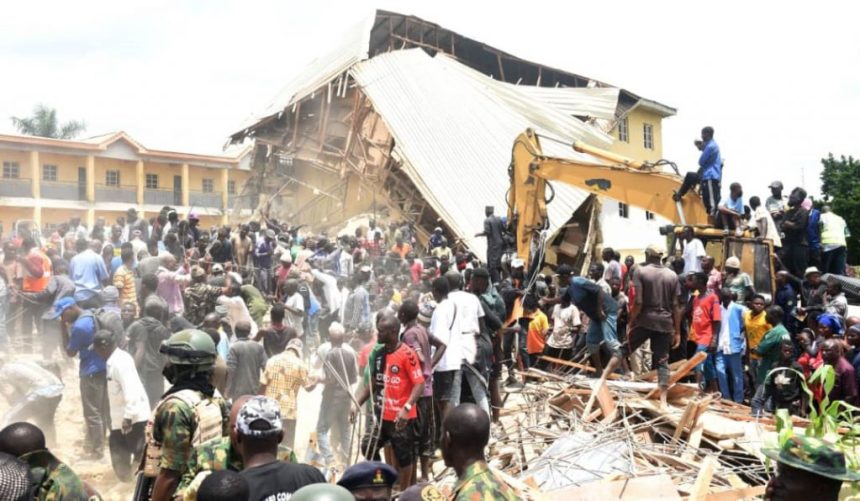Special to USAfrica magazine (Houston) and USAfricaonline.com, the first African-owned, US-based newspaper published on the Internet.
Agbedo is a Professor of Linguistics, University of Nigeria, Nsukka, and contributing analyst to USAfrica)
On Friday 12 July 2024, Nigeria woke up to another gory tale of building collapse as a story building of The Saint Academy, Jos Plateau State caved in, resulting in the tragic death of at least 22 pupils and leaving 120 others trapped as at the time of the news report. The avoidable calamity, which snuffed out the bright futures of those innocent children, is a heart-wrenching reminder of the dire state of infrastructure in many parts of Nigeria that underscores the urgent need for systemic reforms to prevent such tragedies in the future.
As the country grapples with the loss, the sheer scale of this disaster is almost incomprehensible. Families are mourning the irreplaceable loss of their children, and the community is reeling from a collective trauma. Each child represents a lost dream, a shattered future, and an irreplaceable void in their families and communities. The collapse of the school building is symptomatic of a larger, systemic problem. It points to chronic negligence and corruption that plague the nation’s infrastructure projects. Substandard construction materials, poor building practices, and lack of maintenance are often the result of corruption, where funds meant for development are siphoned off by unscrupulous officials and contractors. This negligence is a betrayal of public trust and has dire consequences, as evidenced by this tragedy. Just as Nigeria is yet to recover from the Jos building collapse tragedy, a two-story residential building in Phase 2, Site 2, Kubwa Abuja collapsed again, trapping an unspecified number of people, thus calling to mind the epidemic of building collapses that have become a defining feature of the building construction industry in Nigeria. As a recurring nightmare, the pattern of recurrent building collapses has become an alarming hallmark of Nigeria’s construction industry, raising urgent questions about the safety and integrity of our built environment. The collapse of the Abuja residential building is a sad pointer to the fragile state of Nigeria’s construction sector. Rather than isolated incidents, these building collapses represent a disturbing trend that reflects deep-rooted systemic failures. Each collapse brings a devastating toll on human life, leaving families in mourning and communities in shock.
A document released in January 2023 by the Building Collapse Prevention Guild (BCPG) presents a grim picture of the state of Nigeria’s construction industry. It reveals that out of 541 recorded cases of building collapses between 1974 and 2022, a staggering 271 incidents occurred in the past decade alone, resulting in the tragic deaths of at least 531 individuals. This alarming trend of crumbling structures highlights the deep-rooted issues plaguing Nigeria’s building sector. The data from BCPG is a benumbing reminder of the persistent and growing menace of building collapses in Nigeria. The fact that 50 percent of all recorded collapses in nearly five decades have occurred in the last ten years underscores an accelerating crisis that demands immediate and decisive action. The frequent occurrence of building collapses in Nigeria is a clear indication of widespread neglect and malpractice within the construction industry. Going by the findings of the BCPG document, several factors bordering on professional ineptitude and official corruption – excessive loading, substandard materials, faulty designs, poor workmanship, weak foundations – contribute to this crisis. Buildings are often constructed without proper consideration of their load-bearing capacities, leading to structural failures. The widespread use of inferior materials compromises the integrity and safety of buildings. Poor architectural and engineering designs that fail to adhere to safety standards result in unstable structures. Inadequate skills and lack of adherence to best practices among construction workers contribute to the prevalence of collapses. Failure to conduct proper soil analysis and foundation work results in unstable buildings prone to collapse. These issues are further exacerbated by systemic corruption, which allows for the bypassing of regulations and standards, and a lack of accountability within the construction industry. In his verdict on an inquest into the collapse of the 21-storey building on No. 44 Gerard Road, Ikoyi, Lagos State on 1 November 2021 that buried many people alive, the Coroner and Chief Magistrate, Mr. A. O. Komolafe observed that the building collapsed due to negligence by agencies responsible for approval and supervision of the building project. Ironically, the tragic collapse of the Gerard Road, Ikoyi skyscraper, claimed the lives of the owner of the property, Femi Osibona of FourScore Homes, his personal assistant, a visiting friend from USA, a corps member of the National Youth Service Corps (NYSC), and several others. The unfortunate disaster underscored the profound irony and fragility of life, where dreams of grandeur and ambition could be crushed in an instant by preventable failures. The original 13-floor story building was allegedly scaled up several notches up to 21 floors, higher than the original plan perhaps to align with and saturate the bandwidth of vaulting ambition fed by greed. It is a tragic example of how even those at the helm of ambitious projects are not immune to the consequences of systemic flaws within the construction industry. The loss of Osibona and others in the disaster speaks to the fact that safety and integrity in construction are paramount, transcending personal stakes and ambitions. Among the victims were individuals who had varied and promising futures ahead of them. The personal assistant who perhaps had sweet dreams tied to the success of the project, the friend from the US who perhaps saw potential in Nigeria’s burgeoning real estate sector, and the NYSC corps member representing the nation’s future—all these lives were cut short due to a preventable catastrophe. Each victim’s story remained a testament to the human cost of official corruption and infrastructural negligence.
Barely three years after the tragic collapse of the 21-story building at Gerrard Road, Ikoyi, Lagos, Nigeria is once again mourning the horrific fatalities from the collapse of the Saint Academy Secondary School in Jos. The collapse at Saint Academy, Jos, which claimed the lives of innocent students, comes as a devastating reminder of the failure to learn from past mistakes. The Ikoyi tragedy, which resulted in the loss of many lives, including the developer, should have been a turning point. Instead, we find ourselves in a grim déjà vu, witnessing the same structural failings and loss of lives that have become all too common in Nigeria. The human toll of these collapses is immeasurable. Each incident results in the loss of lives, leaving families devastated and communities in mourning. The students at Saint Academy had their futures abruptly cut short, and their families are left grappling with an unimaginable loss. In short, the pains of loss are simply unimaginable!
Each collapse in all the cases under reference is not only a structural failure but a woeful failure of governance, oversight, and responsibility. Today, we mourn the tragic collapse of the Saint Academy Secondary School in Jos, where innocent lives were lost in a preventable disaster. This tragedy reminds us all that such incidents are not isolated. They could happen anywhere, anytime in Nigeria if urgent reforms are not implemented. Who knows where the next collapse will occur if we continue to neglect the glaring issues within our construction industry? The Saint Academy incident is part of a troubling pattern of building failures across Nigeria. These tragedies highlight systemic issues that threaten the safety of citizens in every corner of the country. From schools to residential buildings, no structure is immune if the root causes are not frontally addressed. To prevent future tragedies, comprehensive and immediate actions are required. Building codes must be updated and strictly enforced, with zero tolerance for non-compliance. Anti-corruption measures must be strengthened within the construction industry and regulatory bodies. Those responsible for construction failures must face significant legal and financial consequences. Routine inspections and maintenance must be mandatory for all buildings, particularly schools and other public structures. Citizens should be educated about building safety and encouraged to report any concerns about construction practices.
While the advocated actions are neither new nor in short supply, the persistent challenge remains the lack of political will to implement them. Building collapses in Nigeria have become a distressingly common occurrence. From the Ikoyi disaster to the Saint Academy collapse and of course, the Kubwa Abuja incident, the pattern is clear and deeply troubling. Each tragedy is followed by calls for reforms, yet meaningful change remains elusive. The reasons behind these collapses are well-documented, and so are the solutions. What is missing is the commitment to enact and enforce these solutions. Despite these well-established measures, the lack of political will continues to impede progress. The question is not what needs to be done, but rather, why it isn’t being done. Political will is the critical driver of change. Without it, even the most comprehensive policies and regulations will fail to materialize. The absence of political will manifests in several ways – insufficient budget allocations for regulatory bodies and enforcement mechanisms; lack of stringent oversight and the prevalence of corruption at various levels of government; leaders making promises without following through with concrete actions; entrenched interests benefiting from the status quo resisting reforms. The tragic loss of lives in building collapses is a clarion call for true leadership. It demands that political leaders prioritise the safety and well-being of their citizens over personal or political gains. This requires demonstrating a genuine commitment to implementing and enforcing building safety regulations; ensuring that all actions taken are transparent and that individuals and entities are held accountable for their failures; providing adequate funding and resources to regulatory bodies to perform their duties effectively; collaborating with all stakeholders, including the public, construction industry, and civil society, to ensure comprehensive and sustainable reforms.
The loss of 22 young lives in Plateau State is a profound tragedy that should galvanise the Nigerian state into action. The tragic collapse of the Abuja residential building, following so closely on the heels of the Jos school disaster, is a dire warning that cannot be ignored. The epidemic of building collapses is not just a technical issue but a moral one, reflecting the value placed on human life and safety. The release of the BCPG document is a wake-up call for all stakeholders in Nigeria’s construction industry. It is a clarion call for the Nigerian governments at different levels to come together to address the underlying issues of corruption, negligence, and poor infrastructure. The collapse of the Saint Academy Secondary School in Jos, like many before it, was preventable. The solutions are clear and have been reiterated time and again. What remains is the crucial element of political will to turn these solutions into action.
Our hearts go out to the families who lost their dear ones in the tragic and avoidable incident at Saint Academy Secondary School in Jos. We owe it to the memory of these children to ensure that such a catastrophe never happens again. Their tragic deaths should serve as a turning point in the fight for safer, more secure educational environments for all Nigerian children. As we mourn with them, we must also take decisive steps to prevent such tragedies in the future. We cannot afford to wait for another tragedy before taking action. As we grieve over the needless waste of those innocent lives, we must also focus on providing support to the bereaved families. Counseling services should be made available to help families cope with their grief. Providing financial aid to affected families can help alleviate the immediate burdens of loss. Establishing memorials or holding services to honor the victims can provide a sense of closure and communal solidarity. May God’s grace provide comfort and strength to all those who are grieving, and may this incident serve as a catalyst for the reforms needed to ensure the safety and well-being of all Nigerian children.

On a final note, it is time for Nigeria’s leaders to step up and prioritise the safety of their citizens. The lives lost in these preventable disasters demand that we act now to ensure the safety and integrity of our buildings. The lives lost in these tragedies demand more than just words; they demand decisive, sustained action. Let this be the moment we resolve to end the cycle of preventable building collapses and ensure a safer future for all Nigerians. Let it be a turning point, where we collectively commit to ending the cycle of negligence and its fatal consequences and ensuring that every Nigerian can live, learn, and work in safe environments.










